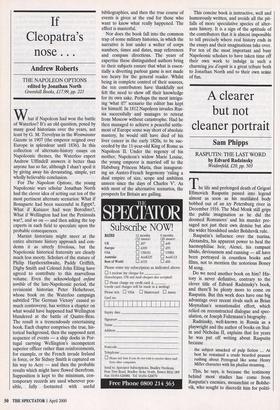If Cleopatra's nose . . .
Andrew Roberts
THE NAPOLEON OPTIONS edited by Jonathan North Greenhill Books, £17.99, pp. 221 What if Napoleon had won the battle of Waterloo? It's an old question, posed by many good historians over the years, not least by G. M. Trevelyan in the Westminster Gazette in 1907 (the emperor reigned over Europe in splendour until 1836). In this collection of alternate-history essays on Napoleonic themes, the Waterloo expert Andrew Uffindell answers it better than anyone has so far, although I shan't spoil it by giving away his devastating, simple, yet wholly believable conclusion.
For The Napoleon Options, the young Napoleonic wars scholar Jonathan North had the clever idea of setting out ten of the most pertinent alternate scenarios: What if Bonaparte had been successful in Egypt?, What if Kutuzov had won Borodino?, What if Wellington had lost the Peninsula war?, and so on — and then asking the top experts in each field to speculate upon the probable consequences.
Marxist historians might sneer at the entire alternate history approach and con- demn it as utterly frivolous, but the Napoleonic historical fraternity are clearly much less snooty. Scholars of the stature of Philip Haythornthwaite, Paddy Griffith, Digby Smith and Colonel John Elting have agreed to contribute to this marvellous volume. Even the acknowledged enfant terrible of the late-Napoleonic period, the revisionist historian Peter Hofschroer, whose book on the Waterloo campaign subtitled 'The German Victory' caused so much controversy, has written a chapter on what would have happened had Wellington blundered at the battle of Quatre-Bras. The result is a tremendously entertaining book. Each chapter comprises the true, his- torical background, then the supposed next sequence of events — a ship docks in Por- tugal carrying Wellington's incompetent superior officer rather than reinforcements, for example, or the French invade Ireland in force, or Sir Sidney Smith is captured on his way to Acre — and then the probable results which might have flowed therefrom. Supposition is kept to the minimum, con- temporary records are used wherever pos- sible, fully footnoted with useful bibliographies, and then the true course of events is given at the end for those who want to know what really happened. The effect is masterful.
Nor does the book fall into the common trap of some military histories, in which the narrative is lost under a welter of corps numbers, times and dates, map references and compass directions. The years of expertise these distinguished authors bring to their subjects ensure that what is essen- tially a diverting parlour game is not made too heavy for the general reader. Whilst being in complete control of their sources, the ten contributors have thankfully not felt the need to show off their knowledge for its own sake. Perhaps the most intrigu- ing 'what if?' scenario the editor has kept for himself. In 1812 Napoleon invades Rus- sia successfully and manages to retreat from Moscow without catastrophe. Had he then managed to achieve a peaceful settle- ment of Europe some way short of absolute mastery, he would still have died of his liver cancer in the early 1820s, to be suc- ceeded by the 11-year-old King of Rome as Napoleon II. Under the regency of his mother, Napoleon's widow Marie Louise, the young emperor is married off to the Habsburg Princess Maria, thus inaugurat- ing an Austro-French hegemony 'ruling a dual empire of size, scope and ambition unseen since the days of Charles V'. As with most of the alternative scenarios, the prospects for Britain are galling. This concise book is instructive, well and humorously written, and avoids all the pit- falls of more speculative species of alter- nate history. It is a sign of the aptitude of the contributors that it is almost impossible to tell precisely where real history ends in the essays and their imaginations take over. For ten of the most important and busy Napoleonic scholars to have taken time off their own work to indulge in such a charming jeu d'esprit is a great tribute both to Jonathan North and to their own sense of fun.






















































































 Previous page
Previous page